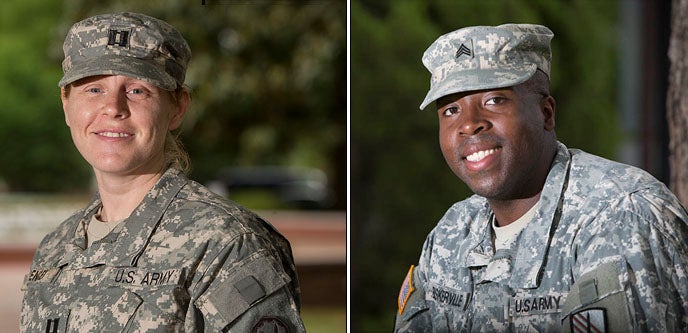SERVICE AND SCHOLARSHIP
ECU graduates reach educational goals despite deployments
Final exams and presentations don’t do much to raise the blood pressure of physical therapy student Michelle “Shelley” Spencer. But there’s nothing like being deployed twice to Iraq to put things in perspective.
Spencer, a Pamlico County native, was first deployed in 2005 after finishing her undergraduate degree. She spent 13 months leading a platoon assigned to convoy security with the U.S. Army in southern Iraq and Baghdad. She was part of the military police unit that relocated Abu Ghraib inmates when the prison was closed.
Upon her return to the states, she enrolled at East Carolina University in 2008 but her studies were interrupted again after two years.
Spencer, promoted to captain, withdrew from school to plan training events for more than 200 troops and prepare for deployment. Then it was back to Iraq in 2011 for seven months, this time leading three platoons spread across three different Army bases.
This week she expects to graduate with a doctorate in physical therapy from the College of Allied Health Sciences – a rigorous three-year degree program that includes 32 hours of clinical training. Surprisingly, she is not alone in successfully juggling military service and school.
“There are so many kids out there who are doing this,” said Spencer. “And they’re younger than me. Sometimes it’s deployment, sometimes it’s training.”
In fact, another student graduating from ECU this week, Demetrius “D.J.” Baskerville, has left school twice following orders from the U.S. Army.
Baskerville will receive his bachelor’s degree in special education from the College of Education. He was deployed to Iraq for 11 months in 2007 as a motor transport operator and again in 2011, this time to Kuwait as an operations and training sergeant.
“College was only supposed to take three years,” he said, smiling. “It has taken seven. But you improvise, adapt and overcome.”
It’s not always easy to adapt, however, when it comes to returning to campus after spending months overseas in a war zone. When Baskerville returned from his tour of duty in Iraq, the peers he had come to ECU with were about to graduate.
“You kind of feel like everyone’s forgotten about you,” Baskerville said. “Nobody understands your story.”
“Most of us are hyper-alert, or we are for a certain amount of time,” Spencer added. “What becomes your norm over there, is not the norm here.”
The support of family and friends helped both students through that transition, they said. And Spencer and Baskerville agreed the faculty in their programs went to great lengths to keep them on track and on top of their coursework.
Dr. Steve Duncan, assistant vice chancellor for Administration, Finance and Military Programs, said he’s proud of the way faculty members have risen to the challenge of supporting students who are reservists and veterans. It’s not uncommon, he said, to provide the work for these students in advance or to continue their education from a distance whenever possible.
“One percent of the people protect 99 percent of us,” Duncan said. “We do as much as we can for that one percent.”
To further these efforts, ECU recently established an office for Student Veteran Services within Student Affairs’ Office of Student Transitions to support students returning from military service.
“Everyone is part of a national defense answer,” Duncan said. “When you step up to help (student veterans), you are part of that answer.”
